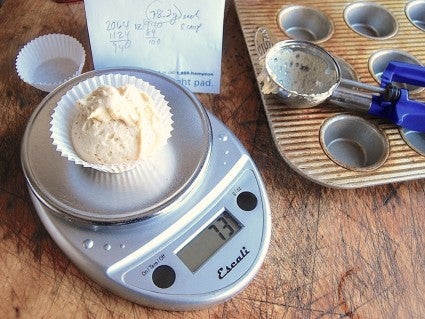Why Digital Scales Transform Your Baking: Precision for Perfect Results

Baking is as much a science as it is an art, and precision is the key to consistent, mouthwatering results. At Delights Bakery, we believe that digital scales are a game-changer for every home baker striving for perfection. Unlike measuring cups, which can lead to inconsistent results, digital scales for baking ensure accuracy, making them an essential tool in your baking essentials arsenal. In this guide, we’ll explore why precision baking with digital scales transforms your breads, cakes, and pastries, and share practical tips to elevate your artisan baking. Let’s dive into the world of baking tools and unlock the secret to flawless baked goods!
Why Precision Matters in Baking
Baking relies on exact measurements to achieve the perfect balance of ingredients. A slight variation in flour or sugar can dramatically affect texture, rise, and flavor. Here’s why accurate measurements are crucial:
- Consistency: Precise measurements ensure every batch turns out the same.
- Texture: Too much flour can make cakes dense; too little sugar can affect browning.
- Rise: Proper ratios of leavening agents ensure optimal lift in breads and cakes.
- Professional Results: Digital scales mimic the precision of professional bakeries.
Unlike volume measurements, which vary based on packing or scooping methods, digital scales measure by weight, eliminating guesswork and elevating your baking equipment.
Digital Scales vs. Measuring Cups
Measuring cups have long been a staple in home kitchens, but they fall short in accuracy compared to digital scales. Here’s a breakdown of the differences:
- Accuracy: Scales measure to the gram or ounce, while cups rely on inconsistent scooping.
- Flour Variability: A cup of flour can weigh 120-150g depending on how it’s packed.
- Ease of Use: Scales allow quick, mess-free measurements with a tare function.
- Versatility: Scales work for all ingredients, from flour to liquids to small quantities like salt.
Switching to a digital scale for baking ensures your recipes are precise, repeatable, and professional-grade.
Benefits of Using Digital Scales
Incorporating a digital scale into your baking tools offers transformative advantages:
- Improved Accuracy: Measure ingredients to the exact gram for flawless results.
- Time-Saving: Weigh directly into mixing bowls, reducing cleanup and prep time.
- Recipe Scaling: Easily adjust recipes by doubling or halving weights.
- Better Gluten Development: Precise flour-to-water ratios improve dough consistency.
- Global Compatibility: Use metric or imperial measurements for international recipes.
How to Choose a Digital Scale
Selecting the right digital scale can enhance your baking experience. Consider these factors:
- Capacity: Choose a scale with a 5-10kg (11-22lb) capacity for versatility.
- Precision: Opt for 1g or 0.01oz increments for small measurements like yeast.
- Tare Function: Allows you to zero out the weight of containers for easy measuring.
- Display: Look for a clear, backlit display for readability in low light.
- Durability: Stainless steel or tempered glass surfaces are easy to clean and long-lasting.
- Units: Ensure it supports grams, ounces, and pounds for flexibility.
Popular models include compact, affordable scales with high precision, perfect for home bakers.
Tips for Using Digital Scales
Maximize your precision baking with these practical tips:
- Calibrate Regularly: Check your scale’s accuracy with a known weight monthly.
- Use the Tare Function: Zero out bowls or containers before adding ingredients.
- Weigh Directly: Place mixing bowls on the scale to reduce dishwashing.
- Measure in Grams: Grams offer greater precision than ounces for small quantities.
- Keep It Clean: Wipe down after use to prevent flour or sugar buildup.
- Store Properly: Store in a dry place to protect electronic components.
Common Mistakes to Avoid
- Ignoring Calibration: An uncalibrated scale can skew measurements, affecting results.
- Overloading: Exceeding the scale’s capacity can damage its sensors.
- Using Volume for Liquids: Weigh liquids like water or milk for accuracy.
- Skipping the Tare: Forgetting to zero out containers leads to incorrect weights.
How Digital Scales Improve Specific Recipes
Digital scales shine in recipes requiring precision, such as:
- Sourdough Bread: Exact flour and water ratios ensure proper hydration.
- Macarons: Precise measurements of almond flour and sugar create perfect shells.
- Custards: Accurate cream and egg ratios prevent curdling.
- Pastry Dough: Consistent butter-to-flour ratios yield flaky results.
Try using a digital scale with our artisan baking recipes to see the difference!
Frequently Asked Questions
Do I Need a Digital Scale for Baking?
While not mandatory, a digital scale greatly improves consistency and accuracy, especially for artisan baking.
Can I Use a Mechanical Scale Instead?
Mechanical scales are less precise and harder to calibrate; digital scales are recommended.
How Do I Convert Volume to Weight?
Use a conversion chart (e.g., 1 cup all-purpose flour ≈ 120-130g) or weigh ingredients directly.
Are Digital Scales Expensive?
Quality scales start at $15-$30, a worthwhile investment for better baking.
Must-Have Pans for Small-Batch BakingFinal Thoughts
Digital scales are a must-have in your baking essentials, transforming your kitchen into a hub of precision baking. At Delights Bakery, we’re passionate about equipping you with tools that elevate your artisan baking to professional levels. Invest in a digital scale, try our recipes, and share your baking successes in the comments below! Have a favorite baking tool or tip? Let us know for a chance to feature it!

Comments
Post a Comment